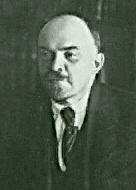| Vladimir Lenin was the leader of the Russian Communist
Revolution of 1917. After the Communists came to power in Russia,
Lenin became the first leader of the Union of Soviet Socialist Republics.
Lenin wanted to apply Marxism within the Soviet Union and around the world
in order to end capitalism and institute Communism. Capitalism in
Marxist terms is an exploitive economic system. Marx thought that
a revolution would be inevitable as a result of dialectical tension between
the classes. Lenin, however, did not agree with the orthodox perspective
that a revolution would spontaneously happen one day. Lenin thought
that a spark or iskra would be necessary to ignite the powder keg of imminent
revolution. Lenin argued that as long as the proletariat had trade
union consciousness, they would be content enough. On the contrary,
Lenin maintained that the leadership of professional revolutionaries --
the Vanguard Party -- would have to lead the proletariat from their trade
union consciousness into revolution. Other ideas from Lenin, include
the notion of the democratic centralism. This was a way to organize
the Vanguard Party. Decision would be "democratically" made by party
apparatchiks, then the decision would be enforced from the top. Democratic
Centralism is an important element in the study of the Soviet Union.
Lenin said that the state would gradually wither away while the remnants
of bourgeois society die. Lenin understood that Communism had two
stages. The first stage is generally
recognized as Socialism. Lenin proposed that "bourgeois right" still
exists in Socialism for the remnants of capitalism remained.
"Socialism converts them [means
of production] into common property. To that extent, and to
that extent alone, does "bourgeois right" disappear [in the first stage
of Communism]."
V.I. Lenin
source: State and Revolution
Different people would receive the same compensation,
for instance. This was not true equality for Lenin, for a family
man would need more compensation than a single man. The same right
applied to different people, to Lenin, was "bourgeois" in nature.
However, the second phase of Communism is pure Communism
where the situation "from each to his ability, to each to his need" would
exist. In this second stage, Lenin thought that true democracy and equality
would exist. There would be then class identification. Eventually,
the state itself would vanish as class antagonisms end. To Lenin,
the state is a product of class antagonisms. In conclusion, the state
only perpetuates class conflict as it tries to deal with the irreconcilable
conflict according to Lenin. |

